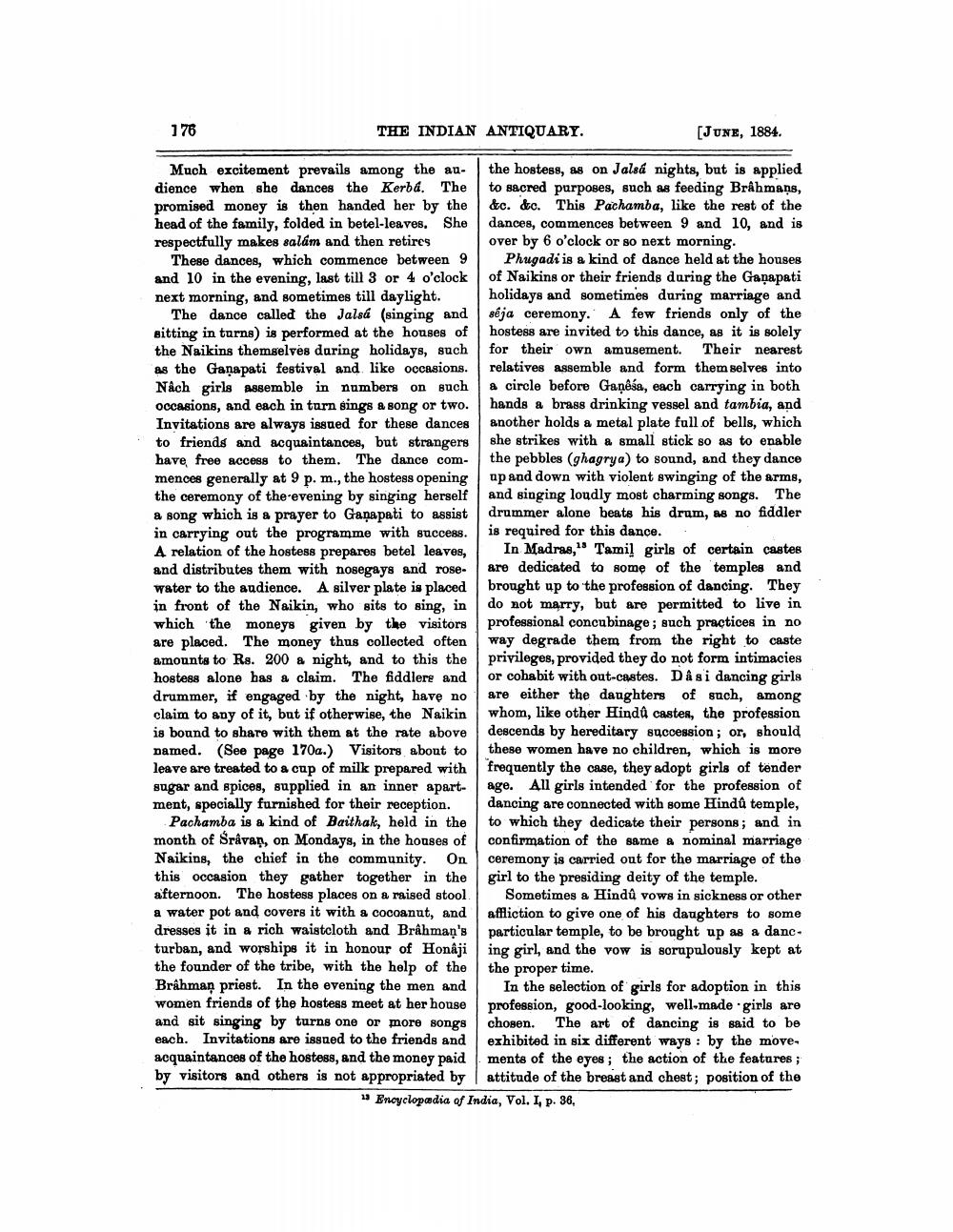________________
176
THE INDIAN ANTIQUARY.
[JUNE, 1884.
Much excitement prevails among the au- the hostess, as on Jalsá nights, but is applied dience when she dances the Kerba. The to sacred purposes, such as feeding Brâhmans, promised money is then handed her by the &c. &c. This Pachamba, like the rest of the head of the family, folded in betel-leaves. She dances, commences between 9 and 10, and is respectfully makes salám and then retires over by 6 o'clock or so next morning.
These dances, which commence between 9 | Phugadi is a kind of dance held at the houses and 10 in the evening, last till 3 or 4 o'clock of Naikins or their friends during the Ganapati next morning, and sometimes till daylight. holidays and sometimes during marriage and
The dance called the Jalsá (singing and séja ceremony. A few friends only of the sitting in tarns) is performed at the houses of hostess are invited to this dance, as it is solely the Naikins themselves daring holidays, such for their own amusement. Their nearest as the Ganapati festival and like occasions. relatives assemble and form themselves into Nach girls assemble in numbers on such a circle before Gandía, each carrying in both occasions, and each in turn sings a song or two. hands a brass drinking vessel and tambia, and Invitations are always issued for these dances another holds a metal plate full of bells, which to friends and acquaintances, but strangers she strikes with a small stick so as to enable have free access to them. The dance com- the pebbles (ghagrya) to sound, and they dance mences generally at 9 p. m., the hostess opening up and down with violent swinging of the arms, the ceremony of the evening by singing herself and singing loudly most charming songs. The a song which is a prayer to Ganapati to assist drummer alone beats his dram, as no fiddler in carrying out the programme with success. is required for this dance. A relation of the hostess prepares betel leaves, In Madras, Tamil girls of certain castes and distributes them with nosegays and rose- are dedicated to some of the temples and water to the audience. A silver plate is placed brought up to the profession of dancing. They in front of the Naikin, who sits to sing, in do not marry, but are permitted to live in which the moneys given by the visitors professional concubinage ; such practices in no are placed. The money thus collected often way degrade them from the right to caste amounts to Rs. 200 & night, and to this the privileges, provided they do not form intimacies hostess alone has a claim. The fiddlers and or cohabit with out-castes. Dasi dancing girls drummer, if engaged by the night, have no are either the daughters of such, among claim to any of it, but if otherwise, the Naikin whom, like other Hindû castes, the profession is bound to share with them at the rate above descends by hereditary succession; or, should named. (See page 170a.) Visitors about to these women have no children, which is more leave are treated to a cup of milk prepared with frequently the case, they adopt girls of tender sugar and spices, supplied in an inner apart- age. All girls intended for the profession of ment, specially furnished for their reception. dancing are connected with some Hindů temple,
Pachamba is a kind of Baithak, held in the to which they dedicate their persons; and in month of Srâvar, on Mondays, in the houses of confirmation of the same a nominal marriage Naiking, the chief in the community. On ceremony is carried out for the marriage of the this occasion they gather together in the girl to the presiding deity of the temple. afternoon. The hostess places on a raised stool Sometimes a Hindů vows in sickness or other a water pot and covers it with a cocoanut, and affliction to give one of his daughters to some dresses it in a rich waistcloth and Brâhman's particular temple, to be brought up as a dancturban, and worshipe it in honour of Honâji ing girl, and the vow is sorupulously kept at the founder of the tribe, with the help of the the proper time. Brahman priest. In the evening the men and In the selection of girls for adoption in this women friends of the hostess meet at her house profession, good-looking, well-made girls are and sit singing by turns one or more songs chosen. The art of dancing is said to be each. Invitations are issued to the friends and exhibited in six different ways : by the moveacquaintances of the hostess, and the money paidments of the eyes; the action of the features ; by visitors and others is not appropriated by attitude of the breast and chest; position of the
13 Encyclopædia of India, Vol. I, p. 36,




